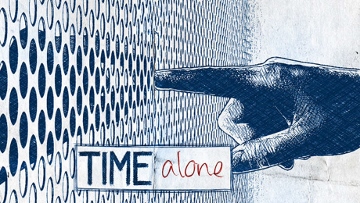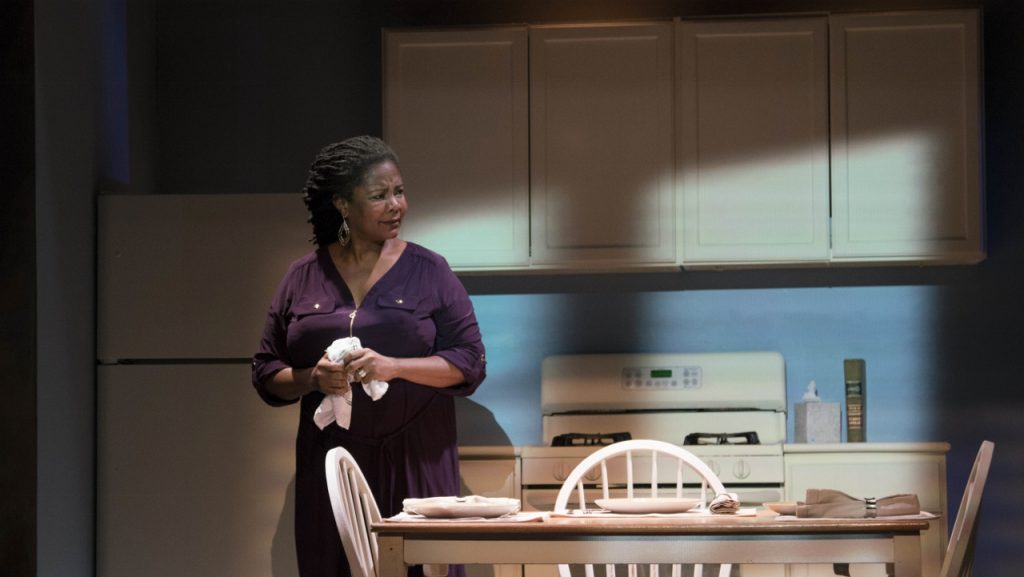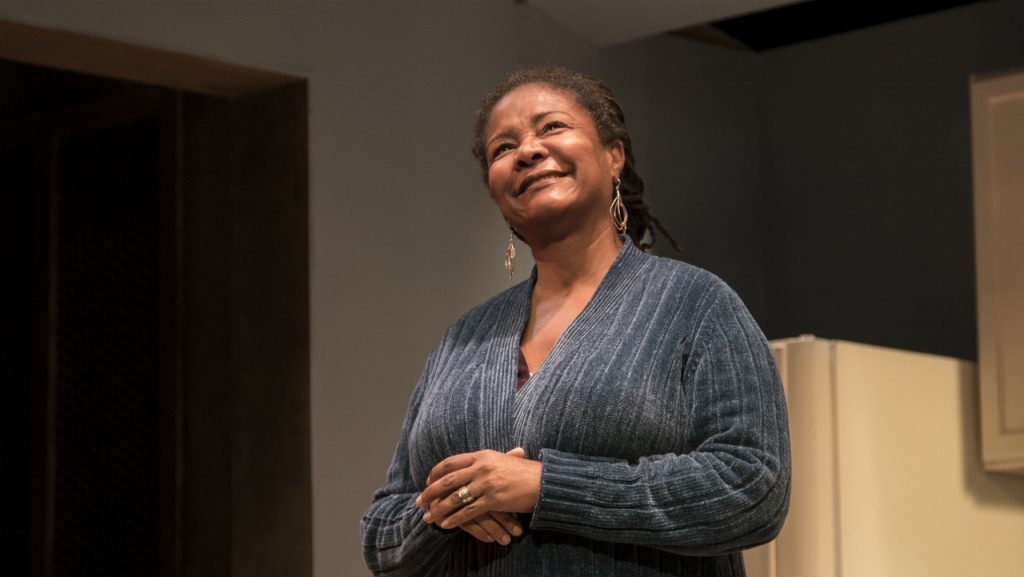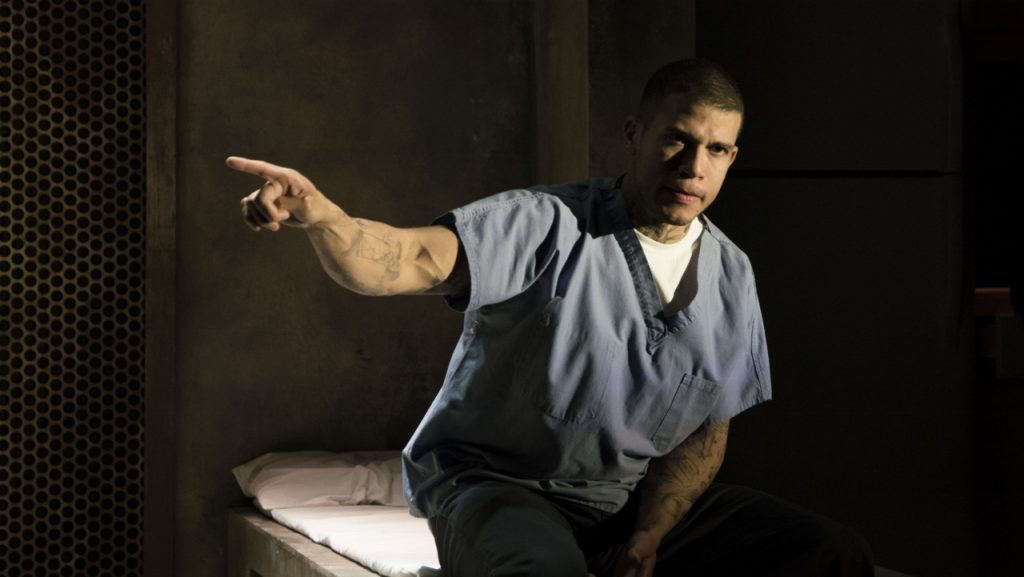THE SOLITARY LONELINESS OF LOSS
There is something cheeky and even a bit dangerous about a writer reaching far outside his or her community, culture, or country. When an outsider succeeds, though, the unfamiliarity can be an advantage, yielding wonder and illumination—as happens here with Italian playwright Alessandro Camon’s remarkable new play, now getting its world premiere by Belle Rêve Theatre Company at the Los Angeles Theatre Center. He creates almost musical dialogue, uncluttered by cliché, liberal guilt, or conservative indignation.
Camon’s intermissionless, 90-minute two-hander is a series of soliloquies. On one half of the stage, Gabriel Wayland (Alex Hernandez) is a convicted murderer, in a Pelican Bay prison cell, in long-term solitary. He is looking at a six-year stretch before even getting a review as to whether he can return to the general population. “There’s three ways to leave this place,” he says. “Snitch. Parole. Die.” He tries to pass the seemingly endless amounts of time any way he can.
The other half of the stage is a kitchen, where Anna Jackson (Tonya Pinkins) is also trying to get through the day, the year, her life. According to her projected lifespan, she has “Forty-two years to go.” Gabriel is actually incarcerated, while Anna’s prison is at first less obvious. She begins with musings about cooking, how everything is a measure of time and heat. She reveals the depth and breadth of her tragic losses slowly. One could say her prison is self-created, but it feels every bit as imposed from without as Alex’s.
I’m in love with Camon’s use of language as the characters invite us into their lives. Alex talks about his mother: “My mom had problems—Money problems. Men problems. Drug problems. Sooner or later, they all became our problems.” He talks about finding out that a cherished nickname his father gave him when he was young, Forty Bucks, was anything but loving. It was the amount of money he and Gabriel’s mother were short when they went to the abortion clinic. So they kept the baby.
His older brother is already doing time before Alex gets into any serious trouble. “He says to me, ‘Don’t follow in my footsteps,’ all I can think is, I like his shoes.” His street name is “Dreamy,” because he is always thinking. Once his mother abandons him (his father is long gone) he finds family in the gang, and is proud to protect their streets. “We’re like child soldiers,” he says, “Like those African kids. Except they got kidnapped. We were born into this.”
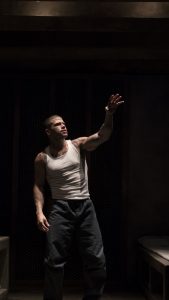 When he first gets to prison at age seventeen: “I’m a small fish in the shark tank, and I don’t wanna make any bubbles.” After proving his strength with a brutal act of violence: “I’m no longer an inmate. Now I’m a fucking convict.” Comparing prison to life in the outside world: “In the free world, violence is not the first response, it’s a last resort.” And one of my favorite lines, referring to the men in solitary: “Just stacked like a bunch of fruit. With the rot spreading from one to the next.”
When he first gets to prison at age seventeen: “I’m a small fish in the shark tank, and I don’t wanna make any bubbles.” After proving his strength with a brutal act of violence: “I’m no longer an inmate. Now I’m a fucking convict.” Comparing prison to life in the outside world: “In the free world, violence is not the first response, it’s a last resort.” And one of my favorite lines, referring to the men in solitary: “Just stacked like a bunch of fruit. With the rot spreading from one to the next.”
Anna beautifully describes her joys. When she meets her future husband, he asks if she likes coffee. “I say, ‘I love coffee. And not the weak stuff either. I don’t want no coffee that you can see the world through. Give me some dark, strong coffee. Sweet as love and hot as hell.’ And damn if I’m not already flirting with him.” They have a son after a difficult pregnancy: “And so, you know how it goes. How you used to be the protagonist in the story of your life, and now someone else is.” Her husband and son have a special bond, frequently awakening early on weekends to play video games together. When her husband apologizes for the noise, she quips, “I love the sound of ‘Super Mario’ in the morning.” It becomes a private joke between the two, filled with affection and delight.
Her husband is a cop, and we learn he was killed in the line of duty: “A bolt from the blue, no warning sign. He kisses me in the morning, and then I brush my teeth… and the kiss is lost… And he never comes back.” He is shot in the throat. “Time splits in half… I’m on the other side,” and, “I don’t want to go forward. There’s nothing there for me.” I brush my teeth… and the kiss is lost. There is a genius and poetry to that line, yet it’s so simple, evoking for me another famous line, uncomplicated yet complex: “I’ve always depended on the kindness of strangers.”
Tonya Pinkins is a treasure of the American theater. She inhabits her role fully, creating a vibrant, real woman with pathos and unforced humor. She is not worried about us liking her, and she exhibits no hint of emotional vanity. Just truth. Searing, heartfelt, uncomfortable, relatable, shattering truth. She doesn’t forgive. “Maybe that’s not Christian of me,” she says, “Truth is, I don’t think that much about God. Way I figure, it’s up to God to break the silence. God gets no more credit at my store. If God exists, God owes me an explanation. God owes me a damn apology.” She also has no sympathy for perpetrators or for their champions, observing how defense attorneys, “Get off on rubbing elbows with evil.” She goes on to wonder, “Is there anything that men don’t kill?” Her grief is always with her. “Closure is a myth,” and, “I’m the sun-crazed sailor on a raft who gulped down the salt water,” she says with a wry grin, “Thirstier now.”
Though the two characters don’t interact, their stories converge, and not in the way you may anticipate. Hernandez has a tough job. His task is to take us into the heart and mind of an admitted killer, seeking to be understood, but not necessarily forgiven. He respects and acknowledges the suffering he has caused others, but he still demands the right to be a human being, not just the property of the state. He marvels that so many of the prisoners are locked up for drug-related reasons, yet the state is a giant pusher, distributing behavior modifying drugs. He imagines them as fierce, ancient gods: “The Gods of Anxiety—Diazepam! Alprazolam! Bromazepam! The Gods of Depression—Amitriptyline! Paroxetine! Mirtazapine! The Gods of Psychosis—Risperidone! Haloperidol! Zuclopenthixol!”
Hernandez skillfully navigates through the sadness, insanity, outrage, and shame, as prison eats up Gabriel’s life. “This is where dreams bleed out.” He cleans his cell obsessively and counts everything, like a muscled and tatted rain-man. At one point, as time splinters, four projections of him appear alongside him. Then the ghosts descend. Meanwhile, Anna has her own view of drugs. “The doctor says, ‘The Xanax and Ambien will work day by day, but Prozac is a long-term project. You need to stick with it. It requires commitment.’ I have no commitment. I’m not committed to my next breath.”
Director Bart DeLorenzo is extremely gifted, even more so because his guiding hand is invisible. Lights and walls move. The prison becomes haunted. Anna lays in the middle of the street, beseeching the traffic to end her life. These highly stylized moments are surprising, then they feel instantly inevitable and essential. The design and technical team is top notch (Francois-Pierre Couture: sets; Ingrid Ferrin: costumes; Pablo Santiago-Brandwein: lights; John Zalewski: sound), with Keith Skretch’s projections especially good—well rendered and beautifully placed within the narrative.
I wouldn’t call Time Alone anything as reductive as an “issue” play, but there are real issues playing out here: The lack of justice for men of color; the ineffectiveness of punishment as a deterrent; the hypocrisy of liberals who want “open borders but gated communities.” Anna and Gabriel are living, breathing embodiments of some of the costs of our failure as a society to treat each other with humanity and respect. They find release, catharsis even, but it doesn’t really change anything. The dead are still dead. “Love connects us selectively, one by one,” Anna says, “But pain… Pain connects us all.”
photos by David Morrison
Time Alone
Belle Rêve Theatre Company
Los Angeles Theatre Center, Theatre 2
514 S. Spring St in DTLA
ends on October 29, 2017
for tickets, call 866.811.4111 or visit LATC
